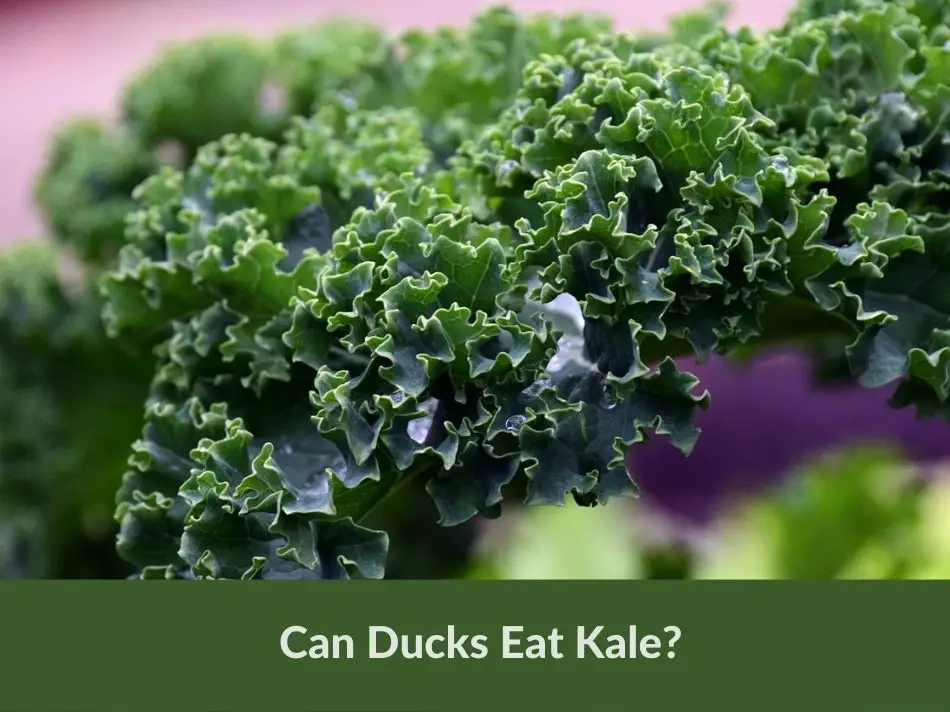Ducks are omnivores, meaning they consume a diverse range of foods. In their natural habitats, ducks feed on aquatic plants, algae, seeds, insects, small fish, and crustaceans. This varied diet helps them meet their nutritional needs and maintain good health. But, can ducks eat Kale?
Yes, ducks can eat kale because it contains healthy vitamins and nutrients. However it’s important to note that kale does contain oxalic acid, which can contribute to thinner eggshells. If your goal is egg production then you should not give your ducks kale.
In this article we will talk more about ducks eating kale.
How Much Kale Can A Duck Eat?
While it is essential to offer ducks a varied diet, incorporating kale in moderation is generally safe. Ducks can consume kale as an occasional treat rather than a staple food.
Introducing new foods gradually and in small portions is advisable to monitor their response and avoid potential digestive issues.
Kale Nutritional Value
Below is the nutritional value of one cup kale.
- Calories: 7
- Carbs: 1 g
- Fiber: 1 g
It also contains several vitamins and minerals as listed below.
- Vitamin K
- Vitamin C
- Manganese
- Vitamin A
- Riboflavin
- Calcium
Is Kale Healthy For Ducks?
Ducks are voracious foragers and tend to consume a variety of food items. Including kale in their diet can promote optimal digestive health. The fiber content in kale aids in digestion, preventing issues like constipation and promoting regular bowel movements. Moreover, kale’s natural abundance of water content helps keep ducks hydrated and reduces the risk of dehydration.
Kale, a member of the Brassicaceae family, is renowned for its exceptional nutrient density. For ducks, it serves as a treasure trove of essential vitamins and minerals. Vitamin A supports healthy vision and immune function, while vitamin K plays a vital role in blood clotting and bone health.
Kale is also a significant source of vitamin C, which boosts the immune system and protects ducks from diseases. Additionally, it contains minerals like calcium, iron, and magnesium, essential for strong bones, energy metabolism, and overall physiological balance in ducks.
Like mentioned earlier it’s important to mention that kale contains calcium oxalate and when it binds with calcium it forms oxalic acid. This can contribute to thinner eggs. Giving your ducks kale in small amounts as a treat should be fine.
How To Feed Kale To Ducks
Wash kale thoroughly to remove any pesticides or chemicals. Chop it into small, manageable pieces to aid in digestion. Offer only small amounts of kale at a time to avoid overfeeding and nutrient imbalances.
Monitor the ducks’ response to kale consumption. If any digestive issues or adverse reactions arise, discontinue feeding kale immediately.
More Vegetables Ducks Can Eat
It’s no secret that ducks love vegetables and below are more you can feed your ducks.
Conclusion
In conclusion, ducks are fascinating creatures with omnivorous dietary habits that support their growth and well-being. While kale is a highly nutritious vegetable for humans, it should be introduced to ducks’ diets with caution and in moderation.
A balanced diet consisting of aquatic vegetation, insects, and appropriate duck feed remains essential for their health.
By understanding the dietary needs of ducks and responsibly incorporating kale into their meals, we can ensure these charming waterfowl continue to thrive in their natural environments and captivities alike.
Disclaimer: The information in this article is for informational purposes only. I'm not an expert or a veterinarian.


